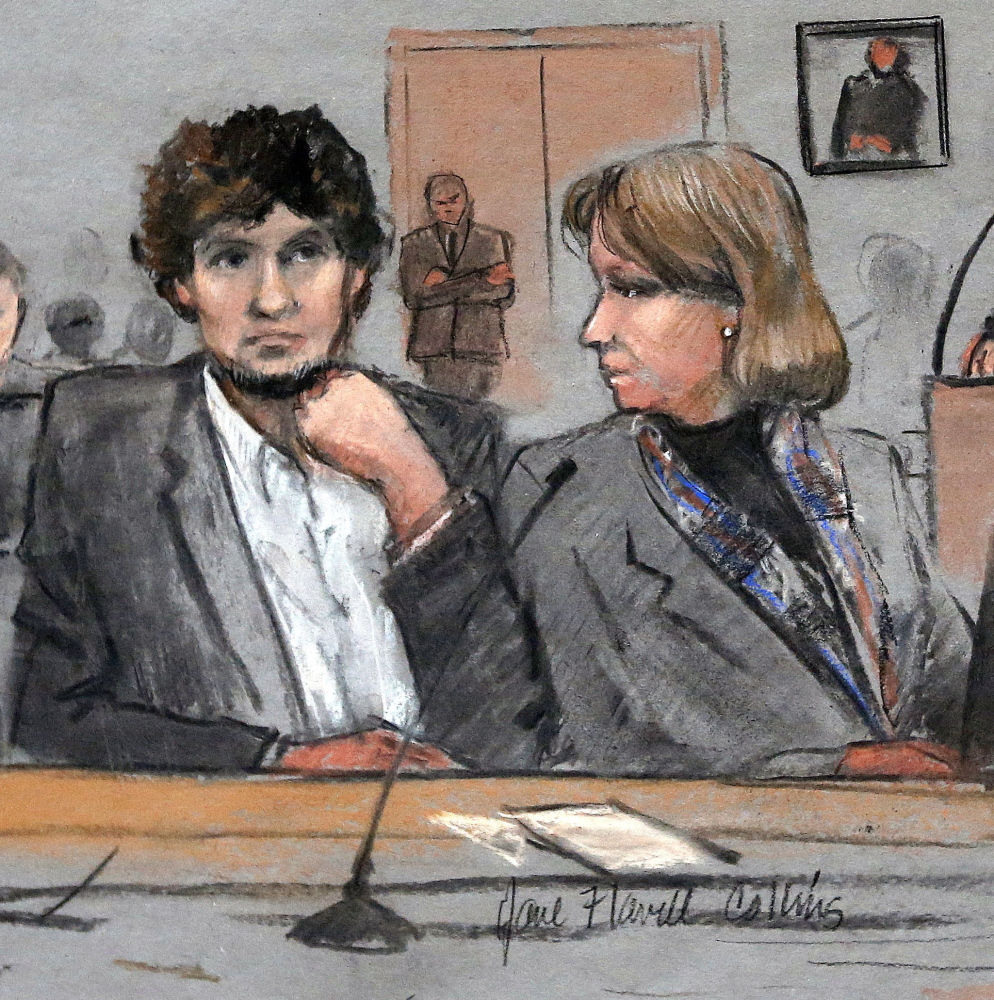BOSTON — She’s the attorney who helped spare the Unabomber from the death penalty, though Ted Kaczynski never forgave her for trying to make him look insane.
She saved Susan Smith’s life, too, by convincing jurors that the vilified South Carolina mother who drowned her children was a fragile victim of sexual abuse who should not be executed.
In 20 years as a defense attorney, Judy Clarke has represented the most notorious murder defendants in modern American history, including Olympics bomber Eric Rudolph and Jared Loughner, who tried to assassinate Rep. Gabrielle Giffords and killed six others.
Every time Clarke has either negotiated plea deals in exchange for a life sentence or persuaded jurors to spare her client’s life.
Now she is faced with what could be the stiffest challenge yet to that perfect record: Keeping Boston Marathon bomber Dzhokhar Tsarnaev off death row.
“This is a very difficult one, no question about it,” said Lesley “Lee” Coggiola, an attorney who worked with Clarke on the Smith case. Coggiola said she is worried that Tsarnaev may be the first client Clarke cannot save, because the government’s evidence appears strong and Bostonians are so traumatized by the April 15, 2013, terrorist attack that jurors may be willing to buck the state’s usual opposition to capital punishment.
Tsarnaev is expected to be found guilty this week when the first phase of the trial ends. That’s hardly a surprise given Clarke’s admission during opening statements that Tsarnaev planted one of the two bombs that killed three people and injured 260 more.
It’s after the verdict – during the penalty phase – when Clarke’s real challenge begins.
Using a legal strategy she has honed over many years, Clarke, 63, will try to portray the 21-year-old as a confused college student from a broken home, a loner manipulated by his more radicalized older brother, and, most important to Clarke, a human life that should not be tossed away, even if he spends the rest of it in prison with no parole.
In pretrial skirmishes, though, she has lost on several key issues, including moving the case out of Boston. Nor has she been permitted to introduce much evidence about the older brother, Tamerlan Tsarnaev.
After representing Smith, Clarke became one of the nation’s leading opponents of the death penalty. She has argued that Smith and her subsequent clients are not monsters, but instead broken, mentally ill victims themselves.
In 1994, Susan Smith strapped her two young sons into the family car and rolled it down the ramp at a lake.
Prosecutors said Smith, separated from her husband, wanted to kill the children because she feared her new boyfriend did not want the responsibility of a family.
Coggiola said it was this case that persuaded Clarke to focus on anti-death-penalty advocacy. Clarke highlighted Smith’s sexual abuse as a child and the pressures of motherhood. She developed a strategy to present the defendant as a “whole person” who made one horrible mistake, Coggiola said.
As a child growing up in South Carolina, Clarke dreamed of becoming chief justice of the U.S. Supreme Court or the courtroom TV hero Perry Mason.
She graduated in 1977 from the University of South Carolina Law School, married a fellow lawyer, and threw herself into the law. Her forte has always been to work hardest in the pretrial phase, hunting for an opening for a plea bargain.
“She’s brilliant,” said Robert Dunham, executive director of the Death Penalty Information Center. “Now they will have to change the picture of him from the prosecution’s suggestion that he is a terrible monster. She has to help the jury come to see that they also have a young man who has some serious problems, but that he is a person too.”
Send questions/comments to the editors.



Success. Please wait for the page to reload. If the page does not reload within 5 seconds, please refresh the page.
Enter your email and password to access comments.
Hi, to comment on stories you must . This profile is in addition to your subscription and website login.
Already have a commenting profile? .
Invalid username/password.
Please check your email to confirm and complete your registration.
Only subscribers are eligible to post comments. Please subscribe or login first for digital access. Here’s why.
Use the form below to reset your password. When you've submitted your account email, we will send an email with a reset code.